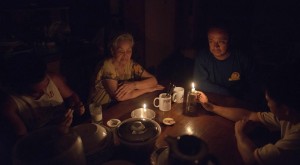Gov’t warns people in disaster-hit areas not to eat meat from carcasses

This picture taken on November 16, 2013 shows typhoon victims sitting around a table inside their partially damaged house at night in Tanauan on the outskirts of Tacloban. AFP FILE PHOTO
MANILA, Philippines—As food supplies have not reached other survivors in less known towns that also suffered the brunt of “supertyphoon Yolanda” (international name Haiyan), health officials on Wednesday reiterated their warning to the people not to eat meat from carcasses of animals that died in the typhoon and meat products that have been submerged in floodwater.
In a joint advisory, the Food and Drug Administration (FDA) and the National Meat Inspection Service (NMIS) advised residents of disaster-hit areas about the health hazards posed eating meat from dead animals.
“Eating dead animals that had not been bled or eviscerated immediately after dying are good source of microbial infections and toxins,” said the FDA and NMIS said in the advisory.
“Bacteria in skin and intestines immediately eats up tissues of the dead animals, including the muscle tissues (meat) causing putrefactions and production of toxic metabolic products. The ill effects of ingesting meat-borne parasites manifest in the later stage of infection,” they explained.
Both agencies stressed that live animals must undergo proper slaughtering in slaughterhouses in order to be safe for human consumption.
Article continues after this advertisementDr. Enrique Tayag, head of the National Epidemiology Center, explained earlier that eating dead animals would pose health risks even if the meat was cooked.
Article continues after this advertisement“Consumption of dead animals pose health risks. Even when these are properly cooked, health risks still remain,” Tayag said on his Twitter account.
He said there would be “no right option” when choosing between hunger and health risk.
Meanwhile, the FDA and NMIS also warned the public against consuming thawed frozen meat and meat products that have been submerged in floodwater for a long period of time.
“Floodwaters usually carry high loads of bacteria and filth. Industrial oil and chemical waste are common toxicants of floodwater. Canned goods that have been submerged in water should also be assessed for any contamination,” the FDA said.
“All consumers are advised to throw out food away from the reach of other people when in doubt about its safety,” it added.
“Yolanda” left trails of destruction and many animals, including livestock and poultry, perished in the floods.
The supertyphoon that hit food establishments in the worst hit areas have also left frozen meat and meat products exposed to elements, some actually buried in soil and rabbles of collapsed houses and buildings.
There have been reports that some typhoon victims began eating dead animals in order to survive hunger amid the continued delays in the arrival of the relief assistance.
RELATED STORIES:
Disaster body lacks satellite phones, others in case of another ‘Yolanda’
Police officer from Tacloban survives to tell his tale